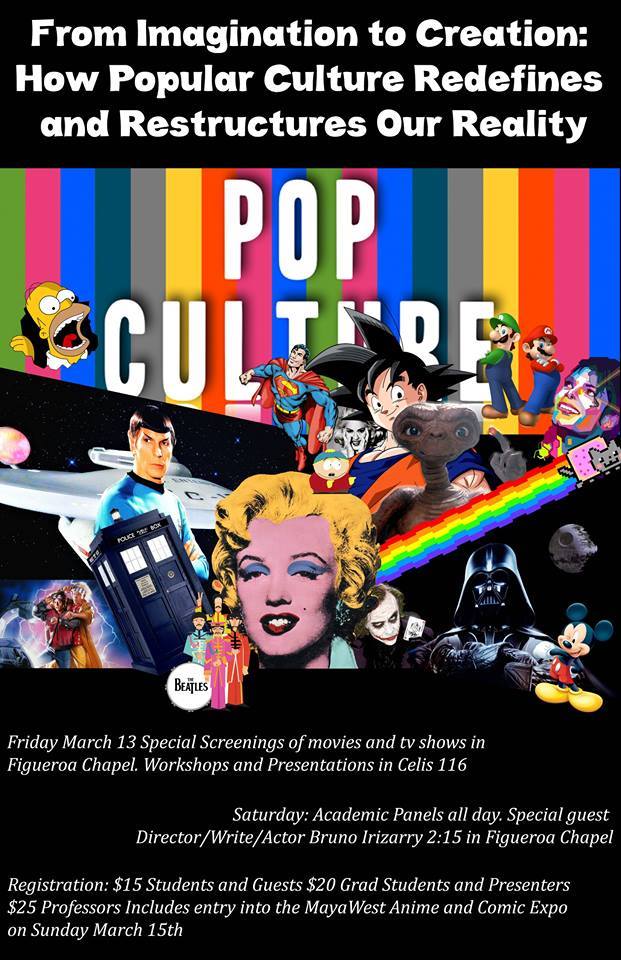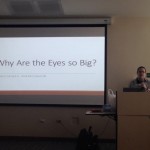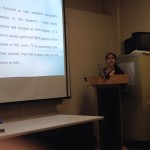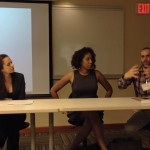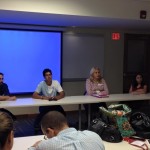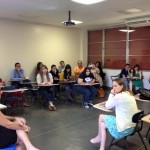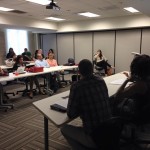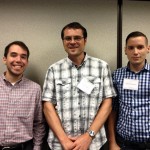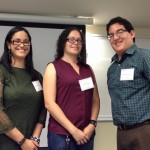The Department of English and the Pop Culture Student Association hosted a Pop Culture conference from Friday March 13 to Saturday March 14. The Conference, titled “From Imagination to Creation: How Popular Culture Redefines and Restructures our Reality”, touched up on important topics that pop culture presents in mass media and focused itself on how to incorporate Pop Culture into Academia.
The panels presented at the conference ranged from the interest in anime and cosplay, to the crude reality of Spanish comics and The Queer in Pop Culture films. Moreover, the presenters ranged from first year undergraduate students from our own English Department, to talented and creative professors such as Nancy Vanessa Vicente. The panels all presented diverse and interesting topics that incorporated Popular Culture into academia seamlessly.
A full list of the schedule for the conference can be found below.
Friday March 13:
Celis 116 Program:
10:30-11:20 “Why Do We Study Popular Culture?” Presentation by Daryl Sanchez
11:30-12:20 “Dressing for the Occasion: Intro to Finding and Making Your Own Cosplay” Workshop by Jo-Anne Hernández
1:30-2:20 “Why Are the Eyes So Big?” Anime Workshop by Christopher Rivera
2:30-3:20 Taller de Narrativa Corta ofrecido por el Centro de Redacción en Español
Anfiteatro Figueroa Chapel Program:
10:30am-11:20am Screening of The Walking Dead Episode TBD
11:30am-12:20pm Screening of Doctor Who Episode 3.10 “Blink”
12:30-1:20pm Screening of Doctor Horrible’s Sing-Along Blog. (the sing-along version)
1:30pm-2:20pm Screening of Mystery Science Theater 3000 Short Films
2:30pm-3:20pm Screening of Star Trek: The Original Series Episode 2.10 “Mirror, Mirror”
3:30pm-3:45pm Welcome Remarks
3:45pm-5:00pm “Mythbusting and Mythbuilding: Popular Culture Across the Faculties.” Roundtable Discussion with Dr. Carmen Santana from Animal Sciences, Dr. Raul Portuondo from Physics, Dr. Jose Lugo from Mechanical Engineering, and Dr. Jose M. Romaguera from Marketing.
7:00pm Special Screening of 200 Cartas
Saturday March 14
7:30am-8:30am Registration
8:30am-9:45am Session 1:
Celis 008 (1A): Judging What’s Right and Wrong: Laws of Nature, Society, and the Supernatural
- “I am the law.”: Disciplinary Careers, the Carceral System, and the Theatre of Punishment in Dredd by Pedro Rios
- Mom +Dad =Family: Indoctrination through Animation. By Yalitza Santos
- “The Laws of the Lawless: Unwritten Rules and Codes of Conduct in The Vampire Chronicles” by Camille Cortés
- And Justice For All: Law, Order, Discipline and Punishment in Injustice: Gods Among Us by Fernando Rodriguez
Celis 009 (1B): Both Sides of the Gutter: Redefining Eastern and Western Comics
- “La cruda realidad del cómic underground español” by Pablo Dopico
- Writing the East and the Cyborg in the Post-Apocalyptic World of Neon Genesis Evangelion by Victor Rodriguez
- Redefining Cape Comics in Grant Morrison’s The Multiversity by Heri Albertorio
- Copywriting Gender: rewriting of the shoujo genre through gender and its performativity in the animated series Gekkan Shoujo Nozaki-kun. By Charlotte Colon
Chardon 319 (1C): Playing with Words: Perpetuating Versions of Reality and Fantasy
- The Challenges of Translating Film and TV. History, Techniques and New Trends. By Alvaro Garcia
- Discursive representation of a sports icon: The case of LeBron James in ESPN web article comment sections by Edward Contreras
- Ethnography of Video Games: Language Creation and Use in Console-Gaming Speech Communities by Michael Osmond
- Gaming between reality and fantasy, present and future by Bayram Gascot
Session 2 10:00am-11:15am
Celis 008 (2A): What’s Wrong with Pink, Orange, and Black?: The Transformation of Social Norms and Perceptions
- Disidentifying with Gender Stereotypes: The Queer in Pop Culture Films by Lizbette Ocasio-Russe
- From Orange to Drag and Finally being Transparent: Exploring Queer Representations in the Small Screen by Gabriel Acevedo
- Contesting Racial Stereotypes in the Puerto Rican Classroom by Nexcy Richardson
Celis 009 (2B): The Descent into Dystopic Paradises
- Adam and Eve in the twenty-first century in the form of Ig Perrish and Merrin Williams by Raisha Medina
- Denver, the Key Witness in Toni Morison’s Beloved by William Rodríguez
- Fighting for Change in Hunger Games and Divergent by Catilia Romero
Chardon 319 (2C): “He Looked like the Marlboro Man”: Analyzing Elements of the Coen Bros Films
- The Architecture of Characters: How the Coen Brothers Portrayed the Characters in No Country for Old Men by Hector Lopez
- Neo-noir Desolation in Fargo by David Rodriguez
Chardon 324 (2D): History of Puerto Rican Music: Matándolos con el “Boom Boom”
- Reguetton’s Effects on Puerto Rican Society by Julio Vega and Marien Villanueva
- El duelo en los temas musicales de los reggaetoneros: una mirada antropológica del duelo en las canciones de los amigos fallecidos by Carlos Enrique Lugo Lorenzo
11:30 am-12:45 pm Session 3
Celis 008 (3A): Voyeuristic (Dis)Order: The Violence in Our Midst
- (Re)Construction of the Final Girl in Slasher Films by Maritza Cardona
- Violence and Memory in A Serbian Film (2011) by Johannys Torres
- America, King of the Monsters: Godzilla as Representative of Postwar Japanese and American Relations by Daryl Sanchez
- La Llorona Sells Out: Interpreting Multicultural Depictions of la Llorona by Stella Ramirez
Chardon 325 (3B): What Makes You so Special?: The Process of Becoming the Chosen One
- Heroes’ Journeys to Overcome Evil within Themselves by Jennifer Mojica
- Mentors as Masters Manipulators in Popular Narratives by Jean Carlo Perez
- More Powerful than you can possibly imagine-Using the Star Wars saga for meaningful life learning in a college writing class by Nancy Vicente
Chardon 319 (3C): (De)Construction of Imagined Identities
- Why bad boys fascinate us: John Constantine and Walter White as male character studies by Frances’Lee Gonzalez
- Fangirling Over Fangirl: The Exploration of the Modern Female Fan Through Rainbow Rowell’s Fangirl by Laura Montalvo
- Turning Fantasy into Reality: The Magic of Fandom by Jo-Anne Hernandez
Chardon 324 (3D): Rocking through the World: Power, Culture, and Identity in Global Music
- “The way they do your life”: Tellability and subjectivation in Gil Scott-Heron by Teofilo Espada-Brignoni
- Isla del Encanta: Alternative Rock and Re-Imagining Cultural Identity in Puerto Rico by Enrique Olivares
- Bohemian Rhapsody: An Existential Rock Anthem by Loyda Pagán
- I am a God: The Power to Put Power in Your Own Hands by Kelsins Santos
12:45-2:15pm Lunch on your own
2:15pm-3:45 pm Keynote Speech by Bruno Irizarry at the Anfiteatro Figueroa Chapel
3:45pm-5pm Session 4
Celis 008 (4A): Warriors, Agents, Sherrifs, and Detectives: The Hero’s Call Knows No Bounds
- The Ringleader And The Phoenix: How Rick Grimes And Carol Peletier Of AMC’s The Walking Dead Redefine Leadership by Amparo Ortiz
- From Bastard to Hero: Jon Snow and Tyrion Lannister’s Journey in A Song of Ice and Fire by Juan Davila
- “Sociocultural Models of Disfigured and Disabled Peoples in James Bond Films” by Frances Zapata
- A Study of the Mysterious Affairs at Rue Morgue by Juan Colon
Celis 009 (4B): Past Present and Future: Female Empowerment through Time and Space
- A New Approach to Comedy: Mindy Kaling’s The Mindy Project by Monica Ocasio
- Memory and Identity in Joss Whedon’s Dollhouse by Juan Soto
- “Real Men Wear Kilts and Damsel’s Don’t Distress”: The contesting and reversal of gender roles in the Outlander television series by Ivette Lopez
- A Clash of Queens: Gender Roles in George R. R. Martin’s A Song of Ice and Fire by Edna Cruz
Chardon 319 (4C): Brings to Mind: Mnemotic and Memetic Devices for Effective Writing
- “ Arguing with an ‘Anaconda’: Using Popular Culture to Create Thesis Statements” Workshop conducted by Verna Johnson


